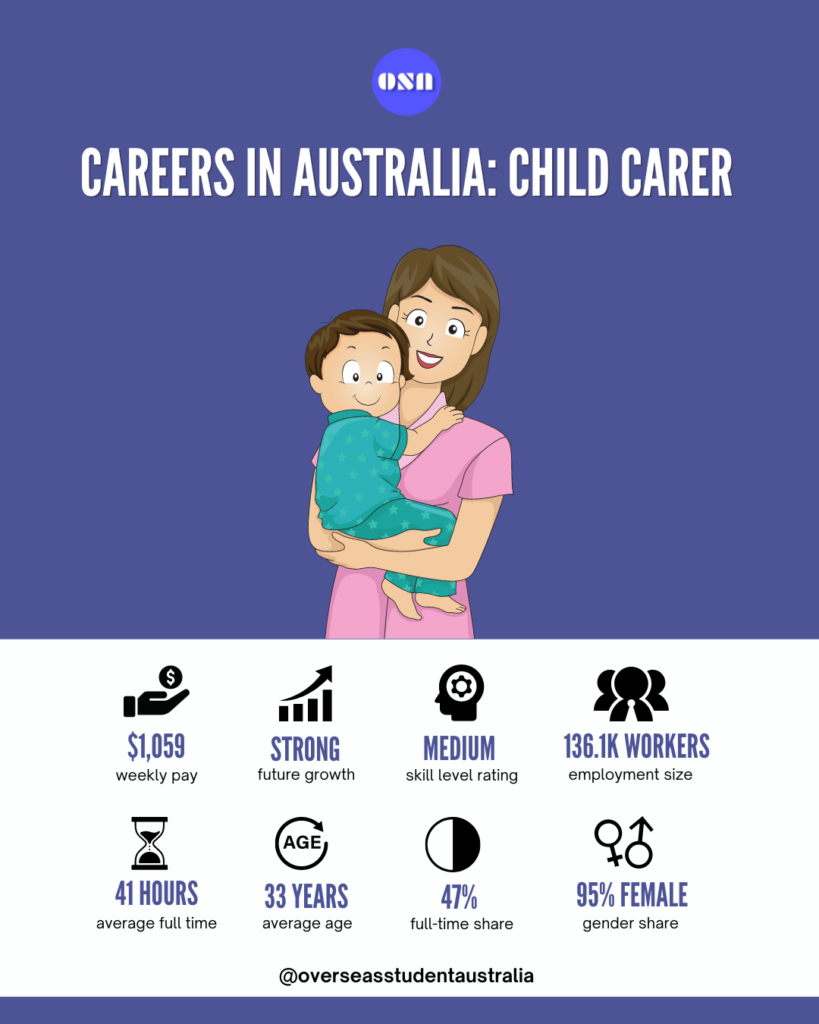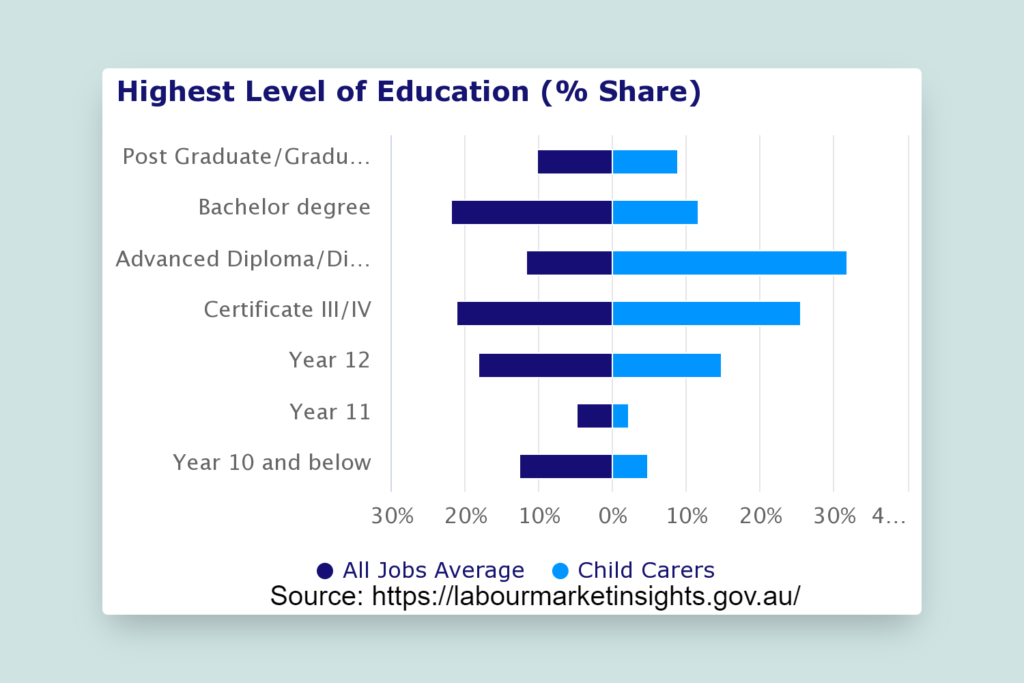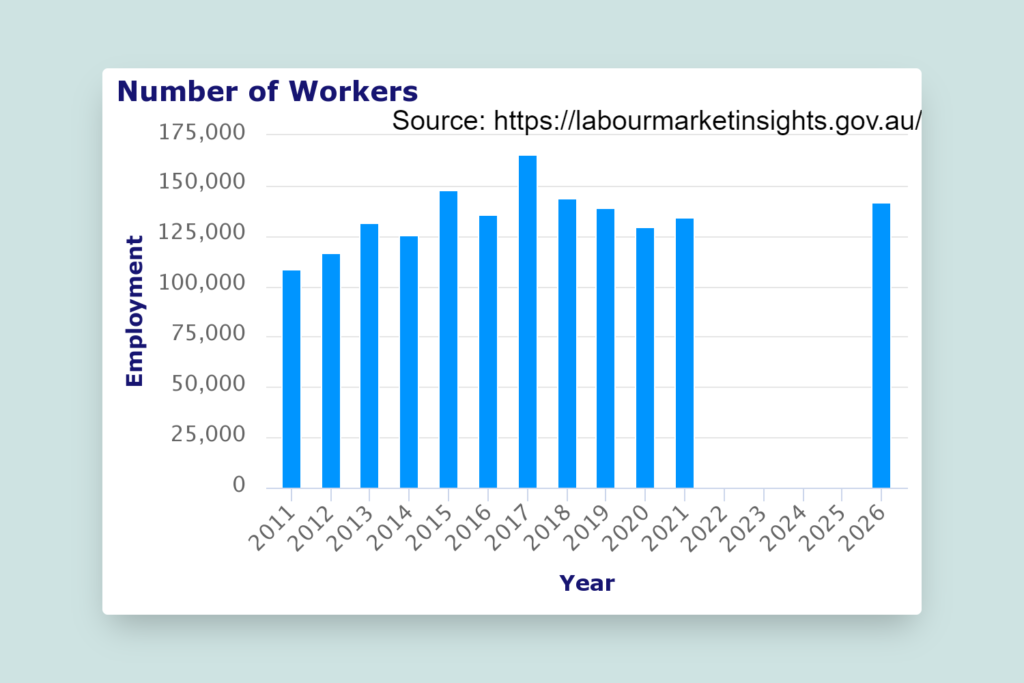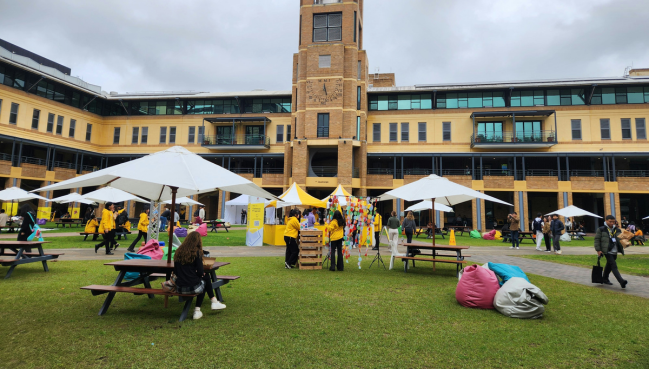How to become a Childcare Worker in Australia with a salary guide

Child carers provide love, care, emotional support and supervision for babies and young children.
Do you love working with young children and babies? Or perhaps you have a passion for caring for young people in their early stages of life? And. If so, then becoming a child carer in Australia is just the right sector for your career path.
This article will give you all the information you need to know about how to become a Childcare Worker in Australia.
Overview of Child Care Industry
Childcare workers play an important role in Australian society as they help in looking after young kids while their parents go out for work.
Usually childcare workers work at childcare centers, kindergartens, hospitals and in private homes as well in Australia.
The majority (69.9%) of couple families with dependents have both parents employed, of which 1.5 million (81.0%) have at least one child aged under 15 years.
In the September quarter of 2021, 47.7% of children aged (0-5) years and 32.5% of children aged (0-12) years used approved child care in Australia.
With most working families, the need for childcare workers in Australia is a must.
Size of the Industry
There are over 135,000 employed child carers in Australia. Projected future growth of 5.3% in the childcare industry by 2026 makes it an amazing career path.
The number of employed child carers in Australia is projected to increase to over 142,000 by 2026.
Popular Locations
Here is the percentage share of child carers in Australia by state and territory as well as their top employing cities:
• New South Wales (33.4%) – Sydney, Mosman, Newcastle
• Victoria 26.6% – Melbourne
• Queensland (20.9%) – Brisbane, Gold Coast
• Western Australia (7.5%) – Perth
• South Australia (6.5%) – Adelaide
• Tasmania (1.7%) – Hobart
• Australian Capital Territory (2.5%) – Canberra
• Northern Territory (1.0%) – Darwin
This is why it is important to consider your potential career path when selecting a city to study or relocate to. Click here to find out how to choose a city to study in Australia.
Industries where childcare workers are needed
A whopping 65.8% of the childcare workers population work in the healthcare and social assistance industry. This industry covers child care services like:
- Supporting children with social and physical activities as well as the basics such as eating and drinking.
- Assisting with hygiene and tasks.
- Monitoring their condition by taking their temperature, pulse, and respiration and possibly helping with medication.
- Supervising children’s behaviour and guiding children’s social development
- Providing medical attention where needed.
Other industries account for 34.2% of registered nurses in Australia. The industries include:
- Education and training 27.6%
- Other services (private homes, childcare facilities etc) 3.3%
- Arts and recreation services 1.1%
- Other industries 2.1%
Hours of work
In Australia, roughly 47% of people employed as Childcare workers work full-time hours, in all their jobs combined. This is 19% below the all-jobs average of 66%.
Full-time workers work an average of 41 hours per week in their main job, similar to the all jobs average of 44 hours per week.
Age
The average Childcare worker’s age is 33 years. This is less compared to other jobs in Australia, which is 40 years. However, most childcare workers in Australia are between 25 to 34 years old.
Also, note that you must be at least 18 years old to be a childcare worker in Australia.
Gender
There are over 135,000 childcare workers in Australia. Females dominate this industry with a 95% quota share of the workforce, while males account for the remaining 5%.
This is 47% above the all-jobs average of 48% for females and 42% below the all-jobs average for males.
What are some of the skills required to become a childcare nurse in Australia?
Some key skills required to become a childcare worker in Australia include:
- Care-giving skills
- Excellent Communication skills
- Emotional Intelligence
- Child psychology
- Alert and Observant
- Organisation skills
- Catering skills
- Listening skills
- Supervision skills
- Multi-tasking ability
- Positive Attitude
- Medical skills
- Professionalism
- Teaching skills
Note that skills can be improved through training or experience.
How much do childcare workers earn in Australia?
The salary of a child carer is relative depending on experience and city location. Average full-time earnings are $1,059 per week, much lower than the all-jobs average ($1,593).
The average hourly earning is $28, lower than the all-jobs average of $41 per hour.

What are the tasks and duties of childcare workers in Australia?
The duties and tasks of the childcare workers can vary Here are some of the regular activities childcare workers are expected to engage in:
- Monitor and positively influence the behaviour of children and guide them in their social development and interactions
- Organise fun, educational, and recreational activities for the children.
- Engage children in a variety of stimulating activities to promote their development, such as outdoor games, reading, basic educational programs, etc.
- Entertain children through activities like playing games, musical activities and reading
- Understand the meal plans specific to the children they care for
- Provide healthy meals for children and feed babies
- Create and maintain appropriate day-to-day routines
- Supervise the daily routine of children, including sleep periods, meal times, education, and recreational activities
- Apply medical skills where necessary
- Ensure their safety at all the times
- Supervise children for extended periods
Step By Step: How to become a child care worker in Australia
Becoming a child carer in Australia does not require a degree qualification. You can get started with vocational courses for your career in the child care industry.
Here is a step-by-step guide on how to become a childcare worker in Australia:
Step 1: Undertake relevant childcare education
In order to work as a child carer in Australia, you will usually be required to have a Certificate III in Early Childhood Education and Care.
Although completing additional relevant child care training can help you have an edge in the market and help you develop your career further in the industry.
Some of these certifications recognised by the Australian Children’s Education and Care Quality Authority are:
- Certificate III in Early Childhood Education and Care
The Certificate III course is a nationally approved vocational program aimed at providing a comprehensive grasp of the early years of a child’s life.
This introductory training teaches how to offer high-quality care and create suitable activities for pre-primary school pupils (aged up to 6 years).
You can expect to learn how best to develop a child’s creativity, numeracy and literacy skills. The duration of this course is 6 months and the average cost is around $4,000 to $5000.
- Diploma in Early Childhood Education and Care
This is a more advanced and globally approved vocational training program. It is ideal for anyone looking to expand their childcare profession.
In order to enrol in the Diploma in Early Childhood Education and Care course, you must have completed a Certificate III in Early Childhood Education and Care.
This course qualifies you to teach children in their most critical years of development and growth.
The duration of this course is 1 year and the average costs $6,000 to $8000.

Step 2: Complete the work placements
Along with the studies, students are expected to undertake a work placement as well.
For students completing the Certificate III in Early Childhood course, they are required to complete at least 120 hours of work placements.
Diploma in Early Childhood Education and Care are expected to complete 280 hours of work placements.
Step 3: You must have up-to-date documentation
You will be required to have the up-to-date documentation when applying for becoming a child care worker in Australia.
- Working With Children Check: It is a screening process to assess the individual if they are fit to work or care for children.
- Police Check: This involves a national police check i.e. criminal history record check of the applicant.
- Immunisation record: Employers expect child care workers to be fully immunised including Flu vaccination and COVID-19 vaccinations
- First Aid Certificate: Child carers are required to complete a first aid qualification from an accredited training provider. This includes CPR, Anaphylaxis and Asthma Awareness training.
- Good references
Suggested Institutions for relevant childcare training
Here are some popular institutions to study child care courses in Australia:
- Swinburne University
- Australian Academy
- TAFE Queensland
- TAFE New South Wales
- TAFE South Australia
- Victoria University
- Western Sydney University
- Melbourne Graduate School of Education
- Skills Australia Institute
- Australia Early Childhood College
Future growth of a child carer career in Australia
As the number of parents in the workforce increases, the demand for need for childcare has also increased. This has rendered the childcare industry a strong carer path, steadily rising in size year after year with a projected 5.9% future growth by 2026.

Also, the most recently adopted work-from-home scheme contributes to the steady demand for child care.
With only 47% of child carers working full-time, it shows an opportunity for other side jobs, which means more income. As a registered child care worker, here are some other specialties you can work in:
- School Assistant
- Family day-care provider
- Early childhood educator
- After school carer
- Corporate childcare
And that is all you need to know about becoming a childcare worker in Australia. Let us know the next career you would like us to cover in the comment section below.


